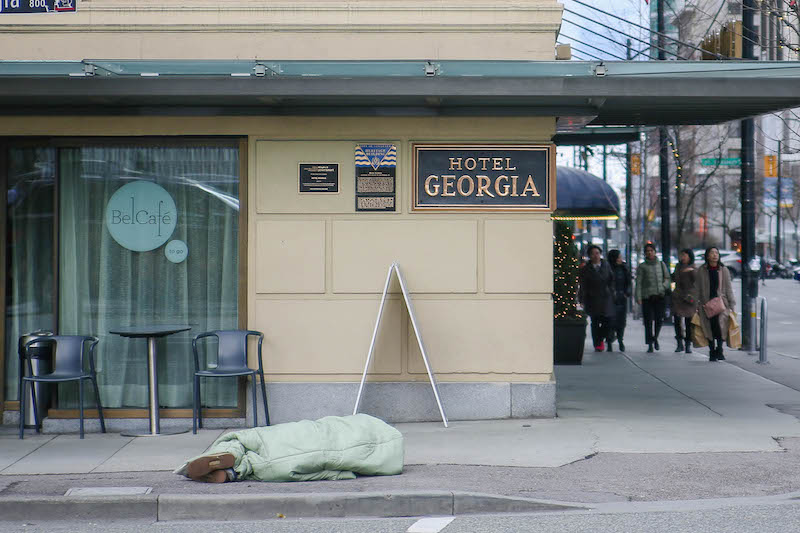Grief is no stranger when you have friends who are homeless.
Anyone who has experienced the loss of a loved one will know the strangeness of realizing you won’t talk with them again, the holes left where you expect to see them, the pileup of things you wish you’d said while you had the chance.
When a loved one’s death involves homelessness, your grief takes on another dimension. I’ve found myself overcome by rage at the injustice of it, baffled and infuriated, thinking that if only those holding power knew, surely they’d do something.
That familiar anger and grief came back to me last week, when the BC Coroners Service released updated statistics on homeless deaths in our fair province. The numbers are grim, and scary. In 2016 — the most recent data available — 175 of our neighbours died homeless in B.C. That number represents a 140-per-cent increase in one year, up from 73 in 2015. It’s a 360-per-cent increase from the 49 deaths in 2014.
As in every previous year that Megaphone has reported on these numbers, the coroners’ statistics again showed the median age of death for a homeless person in B.C. is between age 40 and 49. That’s roughly three decades earlier than the general population. It rivals the lowest general life expectancy of any nation on the planet.
What’s more, we know these numbers don’t reflect the actual toll. The deaths counted here are only those investigated by a coroner, under a definition of homelessness that excludes, for example, people without a permanent address staying temporarily in drug and alcohol treatment centres, hospitals or hotels.
The 2016 numbers show a sharp increase in the number of accidental deaths (drug/alcohol poisoning) that mirrors the timeline of the overdose crisis. In 2016, 53 per cent of all homeless deaths investigated resulted from unintentional drug and/or alcohol poisoning. In previous years (2007-2015), this category accounted for 34 per cent of all deaths on average.
Overdose deaths have taken a terrible toll across the province’s population, not just in the homeless community. And the BC Coroners Service has reported that the majority of the deaths have occurred in residences of various kinds.
But people who experience homelessness and also use drugs are disproportionately affected by many health and safety issues, including the overdose crisis. Across the general population, the overdose death rate was 21 per 100,000 in 2016. Among the homeless population, it was at least 60 times higher.
The evidence is clear: homelessness is life-threatening. It puts people in vulnerable situations, makes existing health conditions worse, creates unbelievable stress and suffering, and places barriers in the way of accessing treatment and support.
But we also know homeless deaths are largely preventable. If we made it a priority to ensure safe, affordable housing, access to health care and treatment and supports, and drug policy that addressed the poisoned drug supply, we would see a dramatic decrease in the number of people dying — and living — on our streets.
Two years ago, when the coroner released the 2015 homeless deaths numbers — a then unprecedented 73 deaths — Megaphone called upon the next provincial government to support a review panel on homeless deaths. Before the 2017 election, both the BC NDP and the BC Greens said they supported the creation of the panel.
But that call has gone unheeded.
Two years later, with the grim 2016 statistics in hand, we’re renewing that call. The urgency should be clear. These latest figures should compel the provincial government to immediately convene a death review panel on deaths among homeless people. A panel could fully examine the circumstances of deaths of people experiencing homelessness and develop recommendations to reduce the likelihood of similar deaths in the future.
A cross-section of experts, from people with lived experience to service providers and researchers, could make specific recommendations on actions to address the circumstances leading to fatalities.
For instance, public health experts working with frontline responders and service providers could identify why homeless people are disproportionately impacted by the toxic drug supply and identify measures to better connect them to harm reduction, treatment and other health services.
A death review panel would not only represent a clear step forward and an acknowledgement of the scale of this crisis, but it would generate specific, actionable ideas to which the provincial government must respond.
We need to push forward with urgent action to house our neighbours now. Anything less is not good enough. Anything less is knowingly leaving our neighbours outside, at risk, dying.
When I’m overcome by anger after another life is cut short too soon, I try to remember that there is hope. When the political will exists to make change, it happens. Homelessness is not some arbitrary force of nature that exists outside of our control. It is directly created by — and can be solved by — human systems. In a province as wealthy as B.C., no one should have to die on our streets, just as no one should have to live on them.
Grief is a natural part of life. But the number of people dying homeless on our streets is anything but natural. ![]()
















Tyee Commenting Guidelines
Comments that violate guidelines risk being deleted, and violations may result in a temporary or permanent user ban. Maintain the spirit of good conversation to stay in the discussion.
*Please note The Tyee is not a forum for spreading misinformation about COVID-19, denying its existence or minimizing its risk to public health.
Do:
Do not: